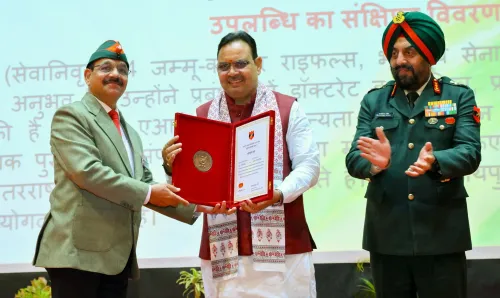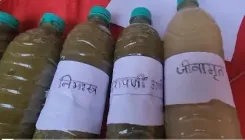Madras High Court Enforces Total Plastic Ban in Western Ghats

Synopsis
Key Takeaways
- Comprehensive ban on 28 plastic products in Western Ghats.
- Ban includes hill stations, wildlife sanctuaries, and tiger reserves.
- Strict enforcement measures with fines for tourists.
- Authorities to impound vehicles carrying banned items.
- Vendors required to use biodegradable packaging.
Chennai, April 16 (NationPress) In a landmark decision aimed at safeguarding the environmentally sensitive Western Ghats, the Madras High Court has enacted a sweeping ban on the production, storage, transportation, supply, sale, and distribution of 28 plastic products throughout the area—from the Nilgiris to the Agasthiyar Biosphere Reserve located in Kanniyakumari district.
This ruling will also encompass all hill stations, wildlife sanctuaries, and tiger reserves.
A specialized bench of Justices N. Sathish Kumar and D. Bharatha Chakravarthy mandated rigorous enforcement strategies, such as imposing fines on tourists who illicitly bring prohibited plastic items to hill stations.
The court instructed authorities to seize vehicles found transporting these materials and revoke their permits.
The banned items consist of a variety of single-use and plastic-coated products, including single-use plastic water and juice bottles, cling film for food wrapping, plastic sheets for tables, plastic plates, and plastic-coated paper plates and cups. Other prohibited items include plastic teacups, tumblers, thermocol cups, non-woven carry bags, water pouches, plastic straws, plastic flags, earbuds with plastic sticks, and all sizes of plastic carry bags. Additionally, candies and ice creams with plastic sticks, as well as polystyrene decorative items, are included.
Furthermore, the court has outlawed plastic cutlery—such as forks, spoons, and knives—as well as wrapping films for sweet boxes, invitation cards, and cigarette packets. Plastic or PVC banners under 100 microns, stirrers, and trays are also banned.
The judges observed that despite the Tamil Nadu government's implementation of a statewide ban on single-use plastics in 2018, which was later extended to Nilgiris and Kodaikanal in 2019, plastic waste has continued to infiltrate the Western Ghats. Smugglers frequently hide banned items in buses and other modes of transport to evade inspections.
In response, the court instructed the state government to leverage its authority under the Motor Vehicles Act to introduce stringent conditions in transport permits. Under these new regulations, any vehicle identified carrying prohibited plastic items will have its permit revoked and face impoundment.
Regarding branded snacks and biscuits in non-biodegradable packaging, the judges mandated that vendors in hill stations must unpack these products and provide them to customers in paper or other biodegradable containers.
To facilitate this transition, local bodies are required to supply these paper bags to vendors at no charge, funded through the Green Fund.
Additionally, the court has mandated District Collectors, civic bodies, and private enterprises to collaboratively create a system for the safe disposal of collected multi-layered non-biodegradable packaging.
The bench firmly stated, “Not a single plastic wrapper, sachet, or packaging material can be scattered in the Nilgiris, Kodaikanal hills, and the entire Western Ghats,” emphasizing the environmental degradation caused by plastic litter and the difficulties associated with its collection and disposal.
This decision follows recommendations made by amici curiae T. Mohan, Chevanan Mohan, Rahul Balaji, and M. Santhanaraman, who assisted the court in analyzing environmental concerns and proposing solutions. To reduce reliance on disposable items, the court ordered the installation of water dispensing machines at key locations across hill stations. Tourists will be provided with reusable food containers, cups, tumblers, and steel bottles through a refundable deposit system managed by self-help groups.
In addition, tourist kits made from biodegradable materials should be distributed, and a dedicated mobile application must be developed to assist tourists in locating nearby water dispensing units or kiosks that offer reusable containers and kits.
Vendors in hill stations are encouraged to promote responsible behavior among their customers to prevent littering.
The bench also called for stringent enforcement of Solid Waste Management Rules in both principle and practice. The court will review the compliance status of these directives on June 6 and issue further orders based on the reports submitted by the authorities.










